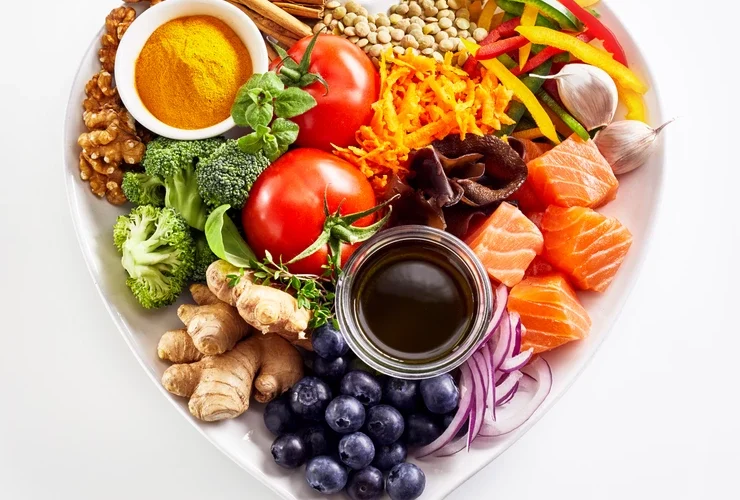➡ Heart-Healthy Foods You Might Be Overlooking
Heart disease remains the leading cause of death in the U.S., but making smart dietary choices can significantly reduce your risk. The foods you eat directly impact heart health, meaning small changes to your diet could help lower blood sugar, reduce bad cholesterol (LDL), and even support artery health.
If you’re looking for heart-smart foods, here are some powerful (and often overlooked) choices to add to your shopping list!
1. Fruits That Fuel Your Heart 🍏🍓🍊
Fruits are packed with essential nutrients that support heart health:
✔ Apples, strawberries, grapes, and citrus fruits are rich in pectin, a soluble fiber known for lowering LDL (bad cholesterol).
✔ Berries (strawberries & blueberries) contain flavonoids that dilate blood vessels, lower blood pressure, and reduce plaque buildup in arteries.
✔ Citrus fruits like oranges and grapefruits are high in vitamin C and heart-protective compounds. However, grapefruit may interfere with certain medications, so check with your doctor.
A study published in Stroke (2012) found that flavonoids in grapefruits and oranges may lower the risk of ischemic stroke in women.
2. Chia Seeds: A Tiny Superfood 🌱
Chia seeds contain more omega-3 fatty acids than any other plant-based food, making them a must-have for heart health. According to the American Heart Association (AHA, 2022):
✔ Omega-3s reduce bad cholesterol (LDL), stabilize blood pressure, and support heart rhythm.
✔ Chia seeds are also loaded with protein, antioxidants, and essential minerals like iron and magnesium.
3. Green Tea: Antioxidant Powerhouse 🍵
Green tea is rich in catechins and polyphenols, powerful antioxidants that:
✔ Protect against heart disease and cell damage.
✔ Reduce the risk of stroke and heart attack, according to a 2016 American Heart Association study.
For maximum benefits, opt for natural green tea leaves without additives.
4. Quinoa: The Complete Protein 🌾
Originally cultivated by the Incas over 4,000 years ago, quinoa is a nutrient-dense, gluten-free grain that:
✔ Contains all nine essential amino acids, including lysine for tissue repair.
✔ Is high in protein, fiber, and heart-friendly minerals.
✔ Can be easily added to salads, soups, muffins, and even pancakes!
5. Dark Chocolate: A Sweet Heart-Helper 🍫
Yes, dark chocolate can actually be good for your heart—in moderation! It contains flavonoids, which:
✔ Improve circulation and reduce inflammation.
✔ May lower stroke risk, according to a 2012 British Medical Journal study.
📌 Tip: Stick to dark chocolate (70% cocoa or higher) and watch portion sizes to keep it heart-healthy!
6. Fatty Fish: The Ultimate Omega-3 Source 🐟
Fresh fish is the best source of omega-3 fatty acids, which can:
✔ Reduce the risk of cardiovascular disease, stroke, and high blood pressure.
✔ Support healthy heart rhythms.
The Mayo Clinic (2020) recommends eating two servings of fatty fish per week to lower heart disease risk. Best choices:
✅ Salmon
✅ Sardines
✅ Anchovies
⚠ Avoid high-mercury fish like swordfish, shark, and king mackerel, which can be harmful to heart health.
.
7. Cauliflower & Cruciferous Veggies: Vitamin C Boost 🥦
Cruciferous vegetables like cauliflower, broccoli, kale, and Brussels sprouts are packed with:
✔ Vitamin C, which supports artery health.
✔ Folic acid, which helps lower heart attack risk (Circulation, 2008).
💡 Tip: Dark leafy greens like spinach and kale are rich in vitamin K, which aids blood clotting—but if you’re on blood thinners, eat them in consistent amounts daily.
8. Beans: The Underrated Superfood 🫘
Heart-healthy beans—pinto, kidney, and black beans—are loaded with:
✔ Soluble fiber, which lowers LDL cholesterol.
✔ Plant-based protein to keep you full and energized.
💡 Tip: Rinse canned beans to remove up to 40% of excess sodium.
.
9. Nuts: Small but Mighty for Heart Health 🥜
Nuts like walnuts, almonds, pecans, and cashews contain healthy fats and omega-3s that:
✔ Lower bad cholesterol (LDL).
✔ Reduce the risk of blood clots and dangerous heart rhythms (Mayo Clinic, 2022).
📌 Tip: Stick to 1 ounce per day—nuts are heart-healthy but calorie-dense!
Final Takeaway: Small Changes, Big Impact!
Incorporating these heart-smart foods into your diet can significantly reduce your risk of heart disease, stroke, and high cholesterol. Whether it’s adding more omega-3s, eating fiber-rich fruits, or choosing dark chocolate in moderation, simple dietary changes can make a huge difference in your heart health.
➡ Which of these heart-healthy foods do you already eat? Let us know in the comments! 💬💙





